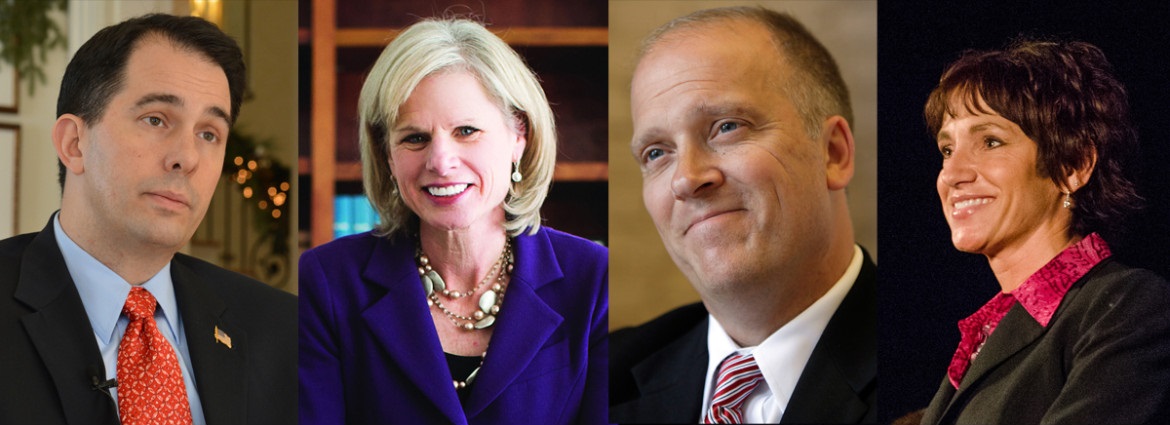How Rivals for Governor, Attorney General Would Handle Drunken Driving
Only Burke calls for making first-offense OWI a crime in Wisconsin.

No one disputes that drunken driving is a serious problem in Wisconsin. But the candidates for governor and attorney general differ in how they would address it.
No one disputes that drunken driving is a serious problem in Wisconsin. But the candidates for governor and attorney general differ in how they would address it.
“Driving while intoxicated is unacceptable,” Republican Gov. Scott Walker wrote in response to written questions. The state’s rate of alcohol-related crashes and carnage has significantly declined, he noted, citing the state’s last major toughening of its drunken driving laws, in mid-2010, before he was elected.
“Since I took office, total alcohol-related crashes declined 16 percent, alcohol-related crash injuries declined over 24 percent, and OWI convictions declined nearly 24 percent, comparing 2013 and 2010,” Walker wrote.
Even after those reductions, however, last year there were still nearly 5,000 alcohol-related crashes in Wisconsin, leading to 185 deaths and 2,660 injuries.
“Every other state in the country has criminalized first-time OWIs, and Wisconsin should not be any different,” Burke wrote.
In the 2013-14 legislative session, more than a dozen bills, most authored by Republicans, were introduced to toughen the state’s penalties for operating while intoxicated. But only one managed to pass the GOP-controlled Legislature.
The Legislature did also increase funding for alcohol treatment and diversion programs, which Walker approved. He cited this change as well as the state’s “aggressive” anti-drinking and driving campaign, “Zero in Wisconsin,” run by the state Department of Transportation.
Burke said she is also open to “preventative solutions that we can use to address this problem in the long term.” And while she backs legislative efforts to address the problem, Burke stressed that any changes must be “fiscally responsible” and not create unfunded mandates for local governments.
Walker said he was open to “looking at changes to state law in a comprehensive way in partnership with the Legislature to see where we can improve.”
The candidates for state attorney general — Republican Brad Schimel and Democrat Susan Happ, both with law enforcement backgrounds — were more willing to address specific proposals.
Schimel, the district attorney of Waukesha County, said he would support changing state law to eliminate the “loophole” that allows some second-time OWI offenders to avoid criminal convictions and some fourth-time offenders to avoid a felony charge if enough years have passed since their last convictions.
But Schimel does not support requiring all persons convicted of OWI to have ignition interlock devices installed on their cars. He said the current standard, which requires these devices only for repeat offenders, first-time offenders with a high blood alcohol concentration and those who refuse a sobriety test, makes sense to him.
Happ, the district attorney of Jefferson County, also backs toughening the penalties for repeat offenders and said she would “consider” requiring interlock devices for all offenders, as part of a comprehensive plan to reduce recidivism.
Happ backs mandatory minimum sentences for OWI offenders who cause injury or death. But both she and Schimel noted that the lone penalty-toughening bill to pass last session had unintended consequences.
That bill created mandatory minimum penalties for drivers who cause substantial injury or death in their seventh or subsequent OWI offense. But it inadvertently erased the ability of prosecutors to criminally charge offenders who cause minor injuries. Happ and Schimel say the law needs to be corrected as soon as possible.
The attorney general candidates expressed support for treatment programs like those in place in their counties. They restated their reluctance to make first-offense drunken driving a crime in Wisconsin, each citing a lack of evidence that this would be effective.
“We cannot incarcerate our way out of our problems,” Happ wrote, pledging a multifaceted approach of “strong enforcement, with enhanced penalties, increased mandatory minimums for repeat offenders along with education, prevention and treatment.”
Schimel, while also embracing a range of approaches, specifically called for more law enforcement officers on the state’s roadways. “The ultimate deterrence to drunk driving would be the certainty of knowing if you drive home intoxicated you will be pulled over,” he said.
Bill Lueders is the Money and Politics Project director at the Wisconsin Center for Investigative Journalism (www.WisconsinWatch.org). The Center produces the project in partnership with MapLight.
The Center collaborates with Wisconsin Public Radio, Wisconsin Public Television, other news media and the UW-Madison School of Journalism and Mass Communication. All works created, published, posted or disseminated by the Center do not necessarily reflect the views or opinions of UW-Madison or any of its affiliates.
-
Wisconsin Lacks Clear System for Tracking Police Caught Lying
 May 9th, 2024 by Jacob Resneck
May 9th, 2024 by Jacob Resneck
-
Voters With Disabilities Demand Electronic Voting Option
 Apr 18th, 2024 by Alexander Shur
Apr 18th, 2024 by Alexander Shur
-
Few SNAP Recipients Reimbursed for Spoiled Food
 Apr 9th, 2024 by Addie Costello
Apr 9th, 2024 by Addie Costello






















“The ultimate deterrence to drunk driving would be the certainty of knowing if you drive home intoxicated you will be pulled over,” he said.
Hogwash. You could never put enough law enforcement officers on the road to stop every drunk driver. And the fact that one could get pulled over is obviously not a deterrence now since so many people still drink and drive, so adding more cops is not going to cause fewer people to drink and drive.
Check points….plain and simple. I dont really like the idea but i dislike drunk driving even more.
I dislike drunk driving as well, but check points are unconstitutional and I do not support those at all. There’s a lot of things we could do in this country to solve a lot of problems but would violate our protected freedoms… I am strongly against anything that would do so.
Shouldn’t we become the 50th state to make first-offense drunk driving a criminal rather than civil matter? That alone isn’t going to solve the problem, and it doesn’t mean someone should go to prison for their first drunk driving offense, but the first time a person gets caught is never their first time driving drunk, and having it be a civil offense seems too lenient to me.
@Andy for your information, DUI check points are not unconstitutional. They are, however, barred by a Wisconsin state statute.
Hereiam, I believe that is false and the decision by the supreme court on the matter was flawed. They basically said it did infringe on our rights under the constitution but that the public good outweighs that fact. I think that decision goes against what our constitution stands for and only serves to erode it’s precedence. All these checkpoints are is a large operation to stop people without probable cause. I hope this returns in some form to the supreme court and gets overturned… for all our sake.